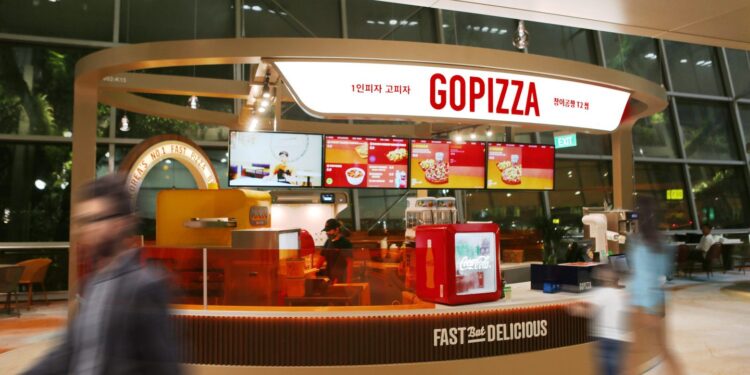As a university student in Singapore over a decade ago, Jay Lim was frustrated: He couldn’t get a pizza just for himself. The lack of “personal pizza options” drove him to create the startup Gopizza on his return to South Korea in 2016.
Gopizza, with its fast service and bite-size pizzas, won an audience among hungry Koreans. But just three years after founding the business, Lim was already looking overseas. The Gopizza founder first went to India, and then to Southeast Asia, in order to give his business the best chance to survive.
The reason? South Korea’s record low birth rate. “The fertility rate is no joke,” Lim says. “Three hundred thousand people are disappearing every year, so it’s a huge issue.”
South Korea has the world’s lowest fertility rate, at 0.72 births per woman in 2023. That means, barring some change, Korea’s consumer market is shrinking.
To make things more difficult, South Korea’s food sector is intensely competitive. “We have a vastly shrinking market and at the same time the highest competition in the world statistically. That leads to investor doubts or skepticism in our industry, which means we can’t get investment, which means we can’t grow fast enough,” Lim explains.
Gopizza goes global
Gopizza claims to be South Korea’s 11th-largest pizza brand, citing its own research using data registered with Korea’s Fair Trade Commission. The startup also says it’s the leading South Korean pizza brand globally, based on store count.
Gopizza first expanded to India in 2019, just three years after its founding. The startup now has over 50 outlets in the country and a menu that caters to the Indian market.
Gopizza is also in Singapore, its second-largest global market after India. Lim says expanding to Singapore was done with investors in mind: Succeeding in Singapore, a small country with a competitive market, would prove to investors that Gopizza had potential.

Courtesy of Gopizza
Gopizza is now Singapore’s third-largest pizza brand, Lim claims. The founder credits the startup’s success in Singapore for a $10 million investment by Thai conglomerate CP All in June.
Gopizza is also looking to expand into Indonesia and Thailand. Lim hopes to have his pizzas served in the latter country’s 7-Eleven convenience stores, operated by his backer CP All.
Starting Gopizza
The idea of Gopizza came from Lim’s frustration over the lack of one-person pizza options while he was a student at Singapore Management University.
Upon returning to Korea, Lim worked part-time in a pizza restaurant, and determined that time was wasted in waiting for the dough to rise and baking the pizza.
Lim decided to use partially baked dough to save time. Gopizza now has its own proprietary dough, which Lim calls an “important component” of the business.
Gopizza is also investing in an AI-powered oven, which it calls the “Goven.” The oven scores pizzas based on toppings, allowing Gopizza executives to track consistency across different outlets globally.
Lim argues that the AI oven could be a new revenue stream for Gopizza if the startup can convince other pizza chains that the “Goven” delivers results. “That’s the next chapter. It’s becoming like a tech company,” he says.







